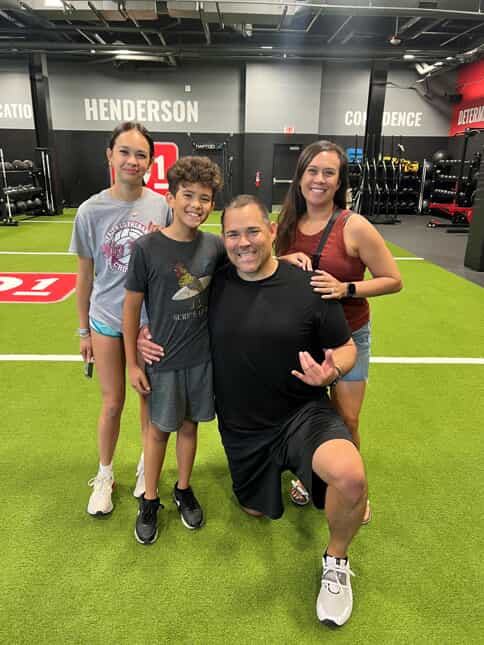 Introduction
Introduction
Obesity is no longer a looming threat; it's a present-day crisis right here in the United States, impacting adults and children alike. And trust us, as folks who live and breathe health and fitness at D1 Training Henderson, we feel the weight of this crisis. It's something we just can't ignore.
Let's talk numbers for a moment. The Centers for Disease Control and Prevention (CDC) threw out some stats that caught our eye: 45.7% of American adults were affected by obesity in 2022. That's a hefty jump from 42.4% just a few years back in 2017-2018. But it's not just the adults; the kids are feeling it too. About 19.3% of children aged 2-19 were classified as obese, up from 17.8% in 2016 (Ward et al., 2020). We will do some math for you, that is a total of 61.2% of Americans who are considered obese, this is not even including the overweight Americans.
These numbers aren't just digits on a page. They're a wake-up call, a shout from the rooftops that something needs to change. We need to roll up our sleeves and tackle this obesity crisis, and we believe the answer lies in teamwork, planning, and maybe a dash of fun. Strategies that involve not just the individual, but the whole family, can make a difference.
Everyday Choices to Combat Obesity
It may be time for most of us to reevaluate our day-to-day activities and the impact on our health…and our family’s health. We talk to people every day about their challenges. These are the most common: short on time, convenience of fast food, picky eaters in the house, high cost of high-quality food. The long-term plan to success will require overcoming the most common challenges. Which we will discuss here:
1. Embrace Regular Physical Activity
A sedentary lifestyle is a significant contributor to obesity. Integrating regular exercise into daily routines can lead to healthier outcomes:
- Adults: Engaging in at least 150 minutes of moderate or 75 minutes of vigorous aerobic activity per week is essential (Rosenberg et al., 2019).
- Children: Encourage activities that are age-appropriate, fun, and beneficial.
2. Prioritize Nutrient-Dense Food Choices
As we mentioned earlier, we hear people commonly complain of the lack of time and the convenience of fast food. You are busy, and will probably not become less busy any time soon. Start to plan around it. There are meal prepping companies that can make meal prepping quick and easy, but they can be expensive. We do partner with a company who is currently offering our clients 10% off, if interested, reach out to us at D1 Henderson. If you are on a budget, consider simple options like grilling your meats for the week and sorting into containers, or even using an instant pot. Instant pots are often better options for the truly busy households because it reduces the amount of time you have to dedicate to actually cooking.
One cannot overstate the importance of a well-balanced diet. For busy families, meal planning and cooking together can be transformative:
- Educate: Knowledge is power. Understanding nutritional content and making informed decisions can lead to healthier eating habits. For example, try tracking your foods for just three days. You may be surprised at what you find. Many of our members are shocked to learn that the high protein products they buy are often their primary source of carbohydrates. The more you know, the easier it is to make informed decisions.
- Cook Together: Involving children in meal preparation can help to ensure that whatever you are cooking is something they will eat. Get their help in the process so they are excited to eat. It's not just about the food; it's about building connections and responsibility. Even if you do not have kids, cook with your partner or friends! Get the people closest to you involved in your new healthy lifestyle. Having the support of the people closest to you can often determine whether or not you are successful.
3. Foster a Supportive Community and Stay Accountable
Accountability and community support are crucial in combating obesity:
- Accountability Partners: As with cooking, having a friend or family member to share the exercise journey can make the process enjoyable and successful. Set goals, check in regularly, and celebrate milestones together.
- Plan Workouts in Advance: Planning workouts ensures consistency and avoids last-minute decisions that might lead to missed opportunities. For example, plan to both be at the 5am workout, so you are not just letting yourself down when you hit snooze. It is often harder to let your partner down than it is to let yourself down.
- Group Fitness Classes: Being part of a group with common fitness goals fosters motivation and makes the process enjoyable. One of our favorite things at D1 is seeing people from all walks of life coming together to support one another. We may have a strong man on one end squatting hundreds of pounds, and a mom at the other end of the racks squatting body weight. Our environment and our coaches bring out the best in our community, and our community brings out the best in us. Even if group workouts are not “your thing”, sit in on one of ours and you may find it is not what you expected. Either way, even if you choose not to workout with us, we want you to support you!
Conclusion
The obesity epidemic among American adults and children is an urgent and complex issue. However, it is not insurmountable. With a concerted effort involving meal planning, cooking together, regular exercise, and community support, it's possible to turn the tide.
Here at D1 Training Henderson, we stand ready to assist you in this vital journey towards health. Let's transform these alarming statistics into a call to action, making positive changes one step at a time.
Sources:
- Centers for Disease Control and Prevention. (2022). Adult Obesity Facts. Retrieved from https://www.cdc.gov/obesity/data/adult.html
- Ward, Z. J., Long, M. W., Resch, S. C., Giles, C. M., Cradock, A. L., & Gortmaker, S. L. (2020). Simulation of Growth Trajectories of Childhood Obesity into Adulthood. New England Journal of Medicine, 377(22), 2145-2153.
- Rosenberg, D. E., Lee, I. M., Young, D. R., Prohaska, T. R., Owen, N., & Buchner, D. M. (2019). Novel strategies for sedentary behavior research. Medicine & Science in Sports & Exercise, 47(7), 1311-1315.
